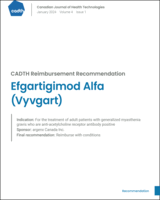|
Initiation
|
|---|
| 1. Treatment with efgartigimod alfa should be reimbursed for adult patients with gMG who have all of the following: 1.1. positive serologic test for anti-AChR antibodies 1.2. an MG-ADL score at baseline of ≥ 5 1.3. MGFA class II to IV disease 1.4. symptoms persist, despite a stable dose of conventional therapy with AChEIs, CSs, and/or NSISTs. | The results from one phase III, multicentre, DB, randomized, placebo-controlled trial (ADAPT) demonstrated that compared with placebo, treatment with efgartigimod alfa results in added clinical benefit in adult patients with gMG who are anti-AChR antibody positive. ADAPT enrolled adult patients (aged ≥ 18 years) with gMG who tested positive for anti-AChR antibodies, had an MG-ADL score ≥ 5, MGFA class of II to IV, and symptoms persist despite a stable dose of conventional therapy with AChEIs, CSs, and/or NSISTs at baseline. | Stable dose may be defined as adequate trial (as determined by the treating physician) of at least 1 of AChEIs, CSs, and/or NSISTs in the previous 12 months. CDEC noted that rituximab may be available in some jurisdictions; however, CDEC heard from the clinical experts that access to rituximab remains a barrier for some patients. |
| 2. Efgartigimod alfa should not be initiated: 2.1. during a gMG exacerbation or crisis, or 2.2. within 3 months of thymectomy. | Patients with class V MGFA who had thymectomy less than 3 months before screening were excluded from the ADAPT trial. The efficacy and harms of efgartigimod alfa in such patients are unknown. | |
| 3. MG-ADL score must be measured and provided by the physician at baseline. | Baseline MG-ADL score was measured in the ADAPT trial and was used to determine response to treatment. | |
| 4. The maximum duration of initial authorization is 3 cycles. | According to the clinical experts, approval for 3 cycles initially would be reasonable to assess response to treatment. | Considerations for maximum duration of initial authorization for approximately 6 months would be reasonable given that the treatment phase in the ADAPT trial was a 26-week treatment period. |
|
Renewal
|
|---|
| 5. Reimbursement of treatment with efgartigimod alfa should be continued if, after the initial 3 cycles of treatment, there is documented improvement in MG-ADL score of 2 points or greater. Reassessment should occur every 12 months thereafter. | According to the clinical experts, clinically meaningful responses would be reflected by improvements in disease symptoms (approximately 2 points on the MG-ADL scale). | Based on clinical expert opinion, after first initial 3 cycles of efgartigimod alfa, if a patient has responded, treatment would be given as long as the patient continues to have a clinically meaningful response (i.e., continuous cycles without defined duration as long as the patient continues to have a clinically meaningful response). In terms of maximum duration of treatment, treatment with efgartigimod alfa would probably be given as long as efgartigimod alfa continued to be effective, or disease spontaneously remitted. |
| 6. For subsequent renewal, the physician must provide proof of no worsening of MG-ADL score. | This will ensure patients are maintaining their response to treatment with efgartigimod alfa. | Based on clinical expert opinion, there is the possibility of efgartigimod alfa being used for 1 year or more years. If a patient had responded to efgartigimod alfa after the 3 initial cycles and was stable for a year, but worsens afterward, this patient who continued to receive treatment cycles after the initial 3 cycles but was no longer receiving efgartigimod alfa (i.e., was an initial responder but was no longer receiving treatment) can reinitiate therapy, as long as they met the initiation criteria. The patient would not be expected to try standard care (AChEIs, CSs, and/or NSISTs) again. |
|
Prescribing
|
|---|
| 7. Efgartigimod alfa should be prescribed by or in consultation with a neurologist with expertise in managing patients with gMG. | Accurate diagnosis and follow-up of patients with gMG is important to ensure that efgartigimod alfa is prescribed to appropriate patients. | |
| 8. Efgartigimod alfa should not be used concomitantly with rituximab or complement inhibitors. | The efficacy and safety of efgartigimod alfa in combination with rituximab, eculizumab, and/or ravulizumab is unknown. | |
|
Pricing
|
|---|
| 9. A reduction in price | The ICER for efgartigimod alfa plus conventional therapy is $1,764,628 per QALY when compared with rituximab plus conventional therapy. A price reduction of 84% would be required for efgartigimod alfa plus conventional therapy to achieve an ICER of $50,000 per QALY compared to rituximab plus conventional therapy. | |
|
Feasibility of adoption
|
|---|
| 10. The feasibility of adoption of efgartigimod alfa must be addressed. | At the submitted price, the incremental budget impact of efgartigimod alfa is expected to be greater than $40 million per year. | |
